“Macron Antoinette”: Alt-Right Targets France
How nationalist internet users are going international
“Macron Antoinette”: Alt-Right Targets France
Share this story
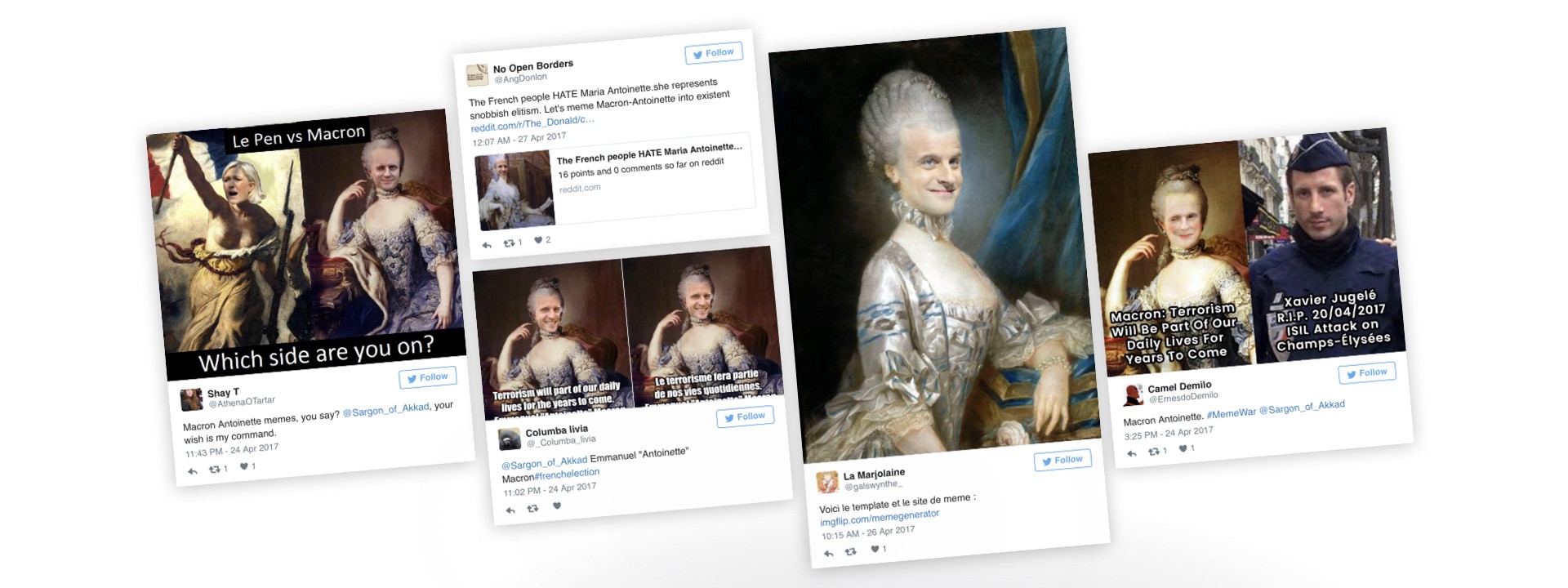
France’s divisive presidential election cycle is nearing the finish line and the stakes are higher than ever. With two candidates left in the running, nationalist Marine Le Pen and centrist Emanuel Macron are going all out to win over the voters of their former competitors.
The internet is a particular battleground. Throughout the election period, dedicated groups both inside and outside France launched online campaigns to support their candidate and attack the others. Le Pen’s backers were especially active online, as the DFRLab reported.
Following the first round of voting on April 23, international commentators from the nationalist “alt-right” movement have stepped up their efforts to support Le Pen with calls for a concerted campaign against Macron.
This activity, pitched largely in English, is instructive, because it shows efforts by essentially nationalist movements in the United States and United Kingdom to influence international politics. As such, it appears to mark a further evolution in the phenomenon.
“Total meme war”
On April 25, an English-language post on message board 4chan called for the launch of a “total meme war” against Macron. The post read (typing errors are kept from the original):
“Alright everyone, our golden queen has won the first round and must now face her final opponent Macron Antoinette. While the media want you to believe that her chances of winning are close to zero, all is not lost. Many of Melenchons (french Bernie) voters are refusing to vote for Macron, which could give us the edge we need. The course is simple
>TOTAL
>MEME
>WAR
Remember, a majority of French people agree with Le Pens policies, but wont vote for her because of the media. We must bombard French social media with pro Le Pen propaganda, to remind the French who is on their side. Our memes must be professional, think back to the #draftourdaughters stuff Main points of new memes
>No Pepes
Pepe is too weird, and wont get that much normie apeal, focus on creating sleek and proffesional stuff instead.
>Portray Macron as a French aristocrat
Really hammer in the point that he dosen’t give a fuck about the common man, and that he is a elitist who know nothing of the common folk.
>Appeal to both Fillon and Melenchon voters
Make two kinds of memes, coservative for Fillion voters, focus on Islam and immigration, and how Macron wont stop it And socialist for Melechon voters, focus on how bad the EU is, and how Macron is a rich banker capitalist pig. This video will provide more ideas https://www.youtube.com/watch?v=EeHi85C1uFk&ab_channel=TheThinkery [Embed] We can win this, but only if we get our blackpilled heads out of our asses and work together. DO YOU WANT TOTAL MEME WAR?!?”
The link leads to a video from YouTube channel “The Thinkery” with further instructions on how to promote Le Pen and delegitimize Macron. As of April 28, the video had been viewed over 130,000 times.
The Thinkery is a YouTube channel run by Twitter user Sargon of Akkad (widely identified online as Carl Benjamin), a UK-based commentator known for his attacks on feminists and Islam, and his role in the Gamergate online harassment controversy. Like the 4chan post, the video calls for a “professional” approach (at 7:33): “Make these memes look as corporate as possible, make them as shareable and slick and professionally designed as possible. (…) Make sure you do good, solid, professional-looking stuff.”
The most popular comment under the video is:

It is unclear whether the post is meant sincerely or in irony.
The meme war that the post and the video refer back to is the so-called “Great Meme War” — a term coined during the Presidential race in the US when Donald Trump’s supporters conducted guerilla style social media operations to harness support online.

The references in the text place this firmly in the English-speaking alt-right world. French left-wing candidate Jean-Luc Mélenchon, for example, is compared to American Bernie Sanders; “Pepe” is a reference to the frog image widely used by alt-right internet users; “normies” is a derogatory term for “normal people,” who are seen as having been brainwashed by the mainstream media.
They are therefore interesting for the way they expose one particular effort to make the alt-right both more mainstream, and more international.
Themes of the memes
The key narratives the video promotes are Macron’s connection to the Rothschild banking group, and allegations of effeminacy and weakness (including against terrorism), conveyed by comparing him with French queen Marie Antoinette.
Macron’s Rothschild career has been a regular target of attacks, including in the English-language alt-right. In this case, the YouTube and 4chan posts appear to have picked up on an existing trend.
On April 25, the same day the 4chan post and YouTube video appeared, US-based “alternative news” site Liberty Blitzkrieg posted an article attacking Macron as a “consummate banker puppet:”
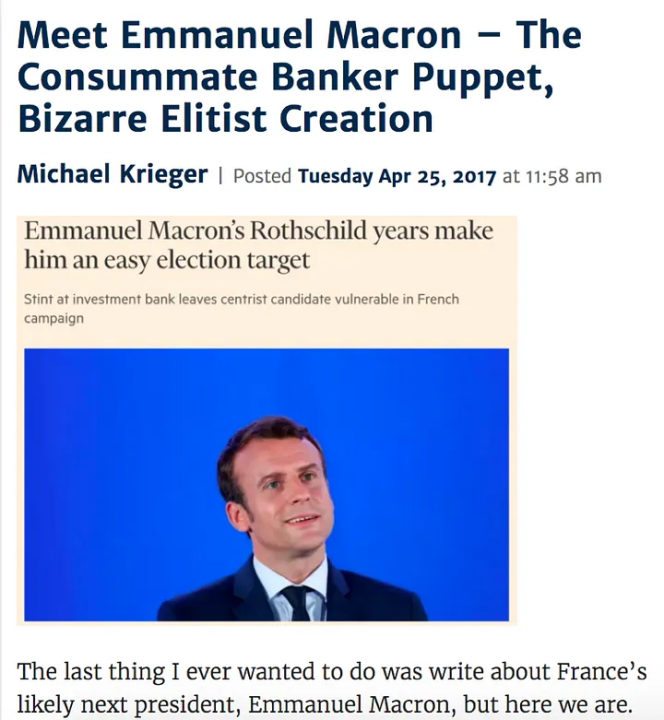
The post was picked up and spread by other alt-right media outlets in English:
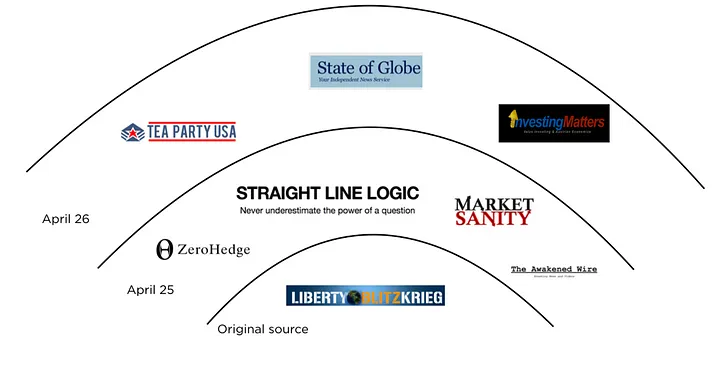
It was amplified by English-language Twitter accounts:

The broader theme also spread in a number of English-language memes, some of which were posted with French texts in the body of the tweets:
Curiously, one of the first accounts to share the Liberty Blitzkrieg post (via sott.net) was @petejohn10, which largely focuses on pro-Kremlin content, especially in and around Ukraine:

Memes comparing Macron to Marie Antoinette appeared on the Sargon of Akkad Twitter account on April 24, though without the name “Macron Antoinette” itself:
The meme was picked up by other accounts, primarily English-language, and some of them tagging the Sargon account.
Macron Antoinette. #MemeWar @Sargon_of_Akkad pic.twitter.com/PQECxcvmXi
— Camel Demilo (@ErnesdoDemilo) April 24, 2017
On April 26, advice on “emasculating Macron” with the meme was posted on a Reddit page devoted to Le Pen, which the DFRLab has already identified as part of an alt-right cluster targeting countries including Germany, the Netherlands and the UK.
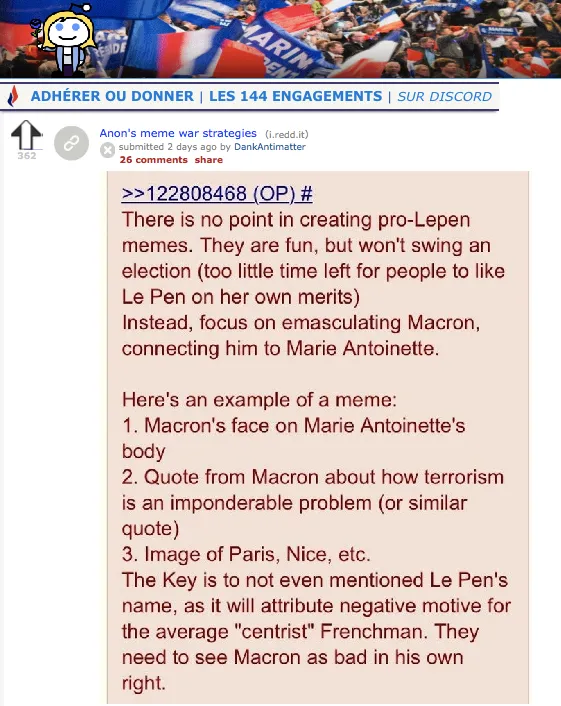
French users began to share similar memes, with one, @galswynthe_, posting a template on April 26:
English-language accounts also continued to spread the meme.
Tellingly, this post links to a meme on subreddit /r/the_Donald, one of the most notorious alt-right insertion points on the network. According to the DFRLab’s study in February, /r/the_Donald shares moderators with /r/Le_Pen.

Macron Antoinette memes, you say? @Sargon_of_Akkad, your wish is my command. pic.twitter.com/u01KmcH2No
— Shay T (@AthenaOTartar) April 25, 2017
However, the meme, and the term “Macron Antoinette,” do not appear to have penetrated widely. The hashtag #MacronAntoinette itself only recorded half a dozen uses, according to a Twitter search.
This is perhaps unsurprising. A link between Macron and Marie Antoinette was initially made in French in 2014, when Macron was minister for the economy:
However, it failed to catch on, being used just twice in 2015 and once in 2016:
Macron Antoinette RT @PierreDeruelle Macron, cossard cravate. pic.twitter.com/jQk23h4Fby
— Le Cid Vicious (@olaf_k) May 28, 2016
These are not the only ways in which Macron has been targeted. Earlier this week, Buzzfeed uncovered another anti-Macron narrative born out of 4chan, which quickly overtook social media. The 4Chan post below encourages others to spread rumors that Macron is having an affair with his step-daughter.
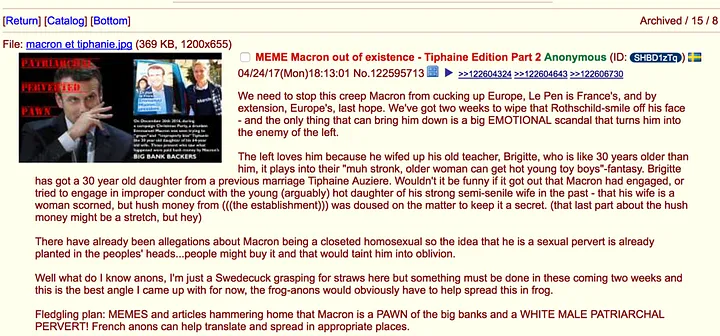
However, not all commentators recommended this theme:
Conclusion
These memes are unlikely to have a significant impact on the French election. None appears to have been widely circulated among French accounts; the “Macron Antoinette” concept was tried before in France, and failed.
Instead, they are interesting for the light they cast on the efforts of English-language alt-right accounts, marked by nationalist, anti-Islam and anti-globalization sentiment, to globalize their own activities and influence election results in other countries.
These efforts appear to mark a further stage in the evolution of the alt-right from a collection of largely national actors to a would-be international one.

